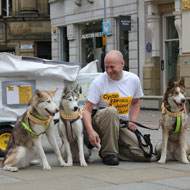Man takes huskies on a trek to Dorset

Keath and his pet huskies will trek 217 miles to their new home to raise money for the Cystic Fibrosis Trust.
A Manchester man has chosen an unusual way to move home - by undertaking a 217-mile husky trek to Dorset to raise funds for the Cystic Fibrosis Trust.
Keath Armstrong is trekking with his three pet Siberian huskies Sakari, Nukka and Nala from his old flat in the Crumpsall area of the city to his new home in Bournemouth and will be passing through Lancashire, Cheshire, Staffordshire, Birmingham, Worcestershire, Warwickshire, Gloucestershire, Wiltshire and Dorset on route.
The huskies are towing a sled, carrying 32-year-old Keath's tent and their food, and are helping him raise money for the trust during the journey as they stop off at various towns, cities and villages - including Congleton, Cheadle, Stoke-on-Trent, West Bromwich, Selly Oak, Redditch, Alcester, Chipping Campden, Stow-on-the-Wold, Swindon, Salisbury and Poole - on the walk to Bournemouth.
Keath was friends with brothers Carl and Richard Jones who both died from cystic fibrosis, a disease that slowly destroys the lungs and digestive system and directly affects around 10,000 people in the UK. Carl died in 2006 aged 20 and Richard – Keath’s best friend - died in 2013, aged 30.
Keath, whose walk is currently in progress, says: “I grew up with Richard in Dorset and now I’m moving back I wanted to do something challenging and different to make more people aware of cystic fibrosis and raise as much money as possible.
"Richard and Carl were brilliant, you couldn’t fault their outlook on life and despite everything they had to put up they were always there for other people. I’m aiming to walk 24 miles a day...but it will depend on the weather – if it’s too hot, the huskies will need to slow down a bit.”
To support Keath, Sakari, Nukka and Nula's trek visit http://uk.virginmoneygiving.com/keatharmstrong.



 The Veterinary Medicines Directorate (VMD) is inviting applications from veterinary students to attend a one-week extramural studies (EMS) placement in July 2026.
The Veterinary Medicines Directorate (VMD) is inviting applications from veterinary students to attend a one-week extramural studies (EMS) placement in July 2026.